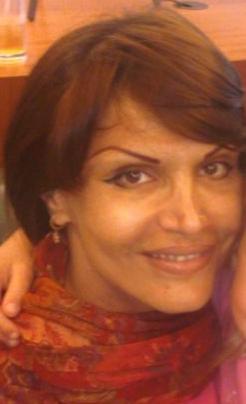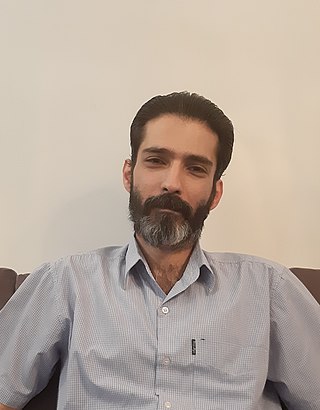
Evin Prison is a prison located in the Evin neighborhood of Tehran, Iran. The prison has been the primary site for the housing of Iran's political prisoners since 1972, before and after the Iranian Revolution, in a purpose-built wing nicknamed "Evin University" due to the high number of students and intellectuals detained there. Evin Prison has been accused of committing "serious human rights abuses" against its political dissidents and critics of the government.

The state of human rights in the Islamic Republic of Iran has been regarded as very poor. The United Nations General Assembly and the Human Rights Commission have condemned prior and ongoing abuses in Iran in published critiques and several resolutions. The government is criticized both for restrictions and punishments that follow the Islamic Republic's constitution and law, and for "extrajudicial" actions by state actors, such as the torture, rape, and killing of political prisoners, and the beatings and killings of dissidents and other civilians. Capital punishment in Iran remains a matter of international concern.
Bahareh Hedayat is an Iranian activist and campaigner for women's rights. She was one of the activists who worked on the One Million Signatures campaign to change laws that discriminate against women in Iran. She has been arrested and imprisoned several times.

Seyed Mohammad Ali Dadkhah is an Iranian human rights lawyer. He is a co-founder of the Defenders of Human Rights Center (DHRC), which has been repressed by the Iranian government. In the aftermath of Iran's disputed June 2009 elections, Dadkhah represented several jailed political and human rights activists. In July 2011, he was sentenced by the Iranian judiciary to nine years in prison for attempting to overthrow the ruling system, among other charges. His sentence was upheld in April 2012, and on 29 September, he was called to prison to begin his sentence.
Zeynab Jalalian is a Kurdish Iranian who has been convicted a mohareb and sentenced to death by an Islamic Revolutionary Court for allegedly being a member of the Kurdish militant group PJAK, which she denies. Jalalian's sentence was later reduced to life imprisonment.
Human rights organizations have condemned Jalalian's verdict, torture, conditions of incarceration and the inattention to her medical care.

Nasrin Sotoudeh is a human rights lawyer in Iran. She has represented imprisoned Iranian opposition activists and politicians following the disputed June 2009 Iranian presidential elections and prisoners sentenced to death for crimes committed when they were minors. Her clients have included journalist Isa Saharkhiz, Nobel Peace Prize laureate Shirin Ebadi, and Heshmat Tabarzadi. She has also represented women arrested for appearing in public without a hijab, which is a punishable offense in Iran. Nasrin Sotoudeh was the subject of Nasrin, a 2020 documentary filmed in secret in Iran about Sotoudeh's "ongoing battles for the rights of women, children and minorities." In 2021, she was named as of Time's 100 Most Influential People in the World. She was released on a medical furlough in July 2021.

Zahra Bahrami, also spelled Sahra Baahrami, was a dual Dutch and Iranian citizen who was executed in Iran after being arrested during a political protest, and later convicted by the Islamic Revolutionary Court for drug trafficking. She was initially arrested in December 2009 for participating in the Ashura protests and charged with national security offenses as well as for being a member of Kingdom Assembly of Iran. However, according to the Iranian Judicatory, a subsequent search of her house uncovered 450 grams of cocaine, 420 grams of opium, and several forged passports. Subsequently, the Tehran prosecutors charged her with drug trafficking and being a member of an international drug-trafficking network, for which she received a death sentence.

Vahid Asghari, is an Iranian political prisoner, advocate for freedom of expression and a women’s rights activist. He was detained by a group of Islamic Republic Guards Corps (IRGC) commandos on May 8, 2008, on his way to the Imam Khomeini International Airport, because of his human rights activities and held in solitary confinement for two years without trial. He was sentenced to death twice by the chairman of the 15th Chamber of the Islamic Revolutionary Court, Judge Abolqassem Salavati, in 2011 and 2012, without participating in the court proceedings and without the freedom to choose his own lawyer. International human rights organizations are following Asghari’s case as he remains in custody.

Mehdi Rajabian is an Iranian composer and musician. He was imprisoned for pursuing illegal musical activities in 2013. In 2019, he released the album Middle Eastern in collaboration with a number of other Middle Eastern artists. Rajabian as the first composer who received the Minority Award of the United Nations. Rajabian has collaborated with musicians including Harvey Mason Jr., Jeff Coffin, Daniel Ho, Wouter Kellerman, Taylor Eigsti, Nicole Zuraitis, Emmanuele Baldini in different projects.
The Greater Tehran Central Penitentiary is a prison approximately 32 km (20 mi) south of Tehran. Sometimes called Tehran Central Prison, it is a large prison, also known as "فشافویه ", "Fashafuyeh" or "Hasanabad-e Qom Prison". It was built in 2012 in the Hasanabad region south of Tehran, in the deserts of the Tehran to Qom highway.
Several thousand prisoners have been or are being transferred to the Greater Tehran Central Penitentiary from Evin, Gohardasht and Ghezel Hessar prisons.
With an official capacity of 15,000 inmates, the prison is the largest detention facility in the country.

Atena Daemi Khoshknudhani is an Iranian civil rights activist, children's rights activist, human rights activist and political prisoner in Iran. Daemi was last arrested in November 2016 and sentenced seven years prison sentence. Peaceful activities for which she was charged include distributing anti-death penalty leaflets and making posts on Facebook and Twitter criticising Iran's execution record. Later, Daemi and her sisters were arrested and sentenced on charges of having "insulted officers on duty". Subsequent appeals have overturned that conviction and reduced Daemi's original sentence.
Marjan Davari is an Iranian researcher, translator and writer who has been studying, teaching, translating and researching new age material, philosophical and metaphysical texts for more than 26 years.
Golrokh Ebrahimi Iraee or Golrokh Iraee is an Iranian writer, accountant, political prisoner and a human rights defender who advocates against the practice of stoning in Iran. As a religious prisoner of conscience she was represented by Vice Chair of the USCIRF Gayle Manchin.
Farhad Meysami is an Iranian physician, teacher and civil activist. He believes in non violence and civil disobedience. He was sentenced to five-year sentence in August 2018 for crimes such as "spreading propaganda against the regime". He was released in February 2023 after a four-month hunger strike that grew international attention.

Amirsalar Davoudi is an Iranian human rights lawyer born on 21 June 1981. He was sentenced to 30 years in prison and 111 lashes for his human rights work.
Kylie Moore-Gilbert is an Australian-British academic in Middle Eastern political science. She was employed as a lecturer at the University of Melbourne's Asia Institute and has carried out research into contemporary political developments in the Middle East. The subject of her PhD research was post-Arab Spring Bahrain.
Yasaman Aryani is an Iranian political prisoner. She appeared without a head scarf, and talked about it on social media.
Shaparak Shajarizadeh is an Iranian women's rights activist and a former political prisoner. She is also a member of women's committee of Iran Transition Council. Shajarizadeh is well known for her efforts in empowering Women's rights in Iran and activism against Iran's contemporary compulsory hijab law. She possess anti-headscarf sentiments and also pioneered online campaigns such as "Girls of Revolution Street" and "White Wednesdays" as a part of the protests against compulsory hijab in an effort to encourage both men and women in Iran to post images in the social media platforms of themselves without wearing headscarves. She was arrested and imprisoned twice for defying Iran's laws about compulsory hijab laws.
Soheila Hejab Bidsorkhi is an Iranian lawyer, political activist, and civil rights activist.
Raheleh Ahmadi is an Iranian political prisoner and the mother of Saba Kord Afshari. She was arrested on 10 July 2019 after protesting the arrest and treatment of her daughter, who had been arrested a month earlier for protesting Iran's compulsory hijab law.










